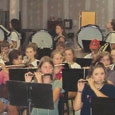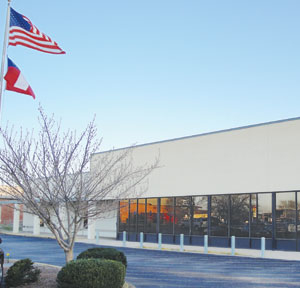 Imagine the look on my colleagues’ faces when I tell them my bands recently had the unusual experience of rehearsing in an old Walmart building for a year and a half. My story goes back to the spring of 2006 when the Barrow County School System in Winder, Georgia finalized a plan to renovate the high school.
Imagine the look on my colleagues’ faces when I tell them my bands recently had the unusual experience of rehearsing in an old Walmart building for a year and a half. My story goes back to the spring of 2006 when the Barrow County School System in Winder, Georgia finalized a plan to renovate the high school.
It was a large project with plans to demolish more than three-quarters of the school structure, including the gym, one of the worst parts of the facility. As you might imagine, the gym complex housed the band and choral programs.
County officials and school administrators searched for choices for a temporary rehearsal space for the bands, considering the fellowship hall of a near-by church and vacant warehouses in the area. They finally decided to transport the Winder-Barrow High School Band to the district’s Professional Devel- opment Center – the old Walmart building – for rehearsals while construction was underway.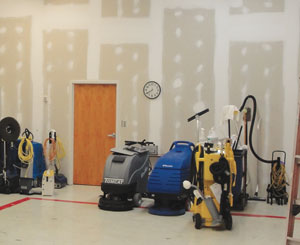
In reality the county had purchased the old structure several years earlier to function as a cental location for all the departments of a school system that were spread throughout the county. The bands would rehearse in the combined loading dock-warehouse storage area of the building. It was a large space inhabited by shelving, old desks, surplus equipment, and other items that had no home in the county schools.
Trailers, Trucks, and Logistics
During construction the majority of students attended classes in a multitude of trailers temporarily located on one of the few green spots left on campus. After several meetings with the transportation department staff, the band directors (Kerry Bryant and me), and administrators, we came up with a way to transport band students to and from Walmart using a county work truck as the primary mobile band room.
This truck, which we directors drove, arrived at a campus parking lot 30 minutes before the start of school so that all the band sudents could place their instruments on board for the one-mile trip to our make-shift rehearsal hall. First period band students loaded school buses at 8:15 and when they arrived at Walmart, helped in removing the instruments from the truck and placing them in the loading zone in the band room.
Rehearsals started about 10 minutes late and ended about 10 minutes early every day (block schedule allows for 90 minute classes) to accommodate packing, reloading, and boarding the buses. If students wanted to take their instruments home after school or back to campus for marching band rehearsal, they had to take them to the loading zone.
The bus returned first-period students to campus and then brought second-period students to band rehearsal a short time later. Then after the end of third period, these students loaded all the instruments and equipment in the loading zone onto the band truck.
Everyone had to plan ahead because the marching band still practiced on campus, and any equipment left behind would not be available for rehearsals. Students who wanted to practice at home would have to make a return trip to Walmart if they forgot their instrument. We kept the extra marching band equipment used for away games on a trailer.
Rough Edges
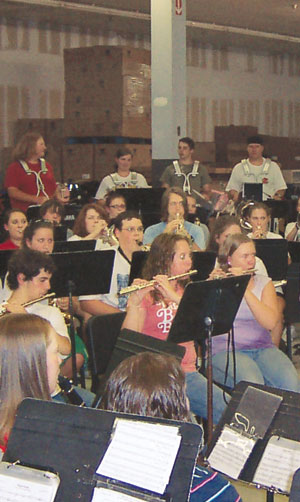 It took time to smooth out unforseen problems in this arrangement. Students who were late for the bus were left on campus and had to complete alternative assignments in the library. If the weather was too hot, after school marching band rehearsals had to be rescheduled. Rainy days meant marchers huddled under the concession stand at the stadium as football players commuted to the YMCA or recreation department.
It took time to smooth out unforseen problems in this arrangement. Students who were late for the bus were left on campus and had to complete alternative assignments in the library. If the weather was too hot, after school marching band rehearsals had to be rescheduled. Rainy days meant marchers huddled under the concession stand at the stadium as football players commuted to the YMCA or recreation department.
Every football game seemed like an away game because the truck and trailer were in use all the time. I had to request transportation for sectionals or other after school rehearsals so students could make the trip to our unusual quarters.
Handling Football Games
Football games also proved to be a challenge. For home games the band met in the cafeteria of the high school after unloading equipment from the truck and trailer parked by the stadium. For away games, students met at Walmart and returned there after each game to meet parents or pick up their cars. It also meant we directors had to activate and deactivate the building’s fire alarm, a scary task considering the other departments in the facility.
The other tenants of the building were entirely welcoming, albeit skeptical at first. The Professional Development Center employees quickly became accustomed to hearing music coming from the back of the building, and it wasn’t strange at all to have Barrow County School administrators or the superintendent look in and listen to rehearsals during their lunch breaks. The students, of course, had strict instructions as to where they could be in the building and adhered to them without incident.
Year Two Begins
By the fall of 2007 the band program started its second year of warehouse rehearsals with the hope and promise that the new band room would be completed by the winter holiday break. True to the building planners’ word, the gym was ready in early December and the Winder-Barrow High School Band moved back to the high school.
The new school facility is a huge improvement over the old design because our Fine Arts teachers assisted with suggestions for floor plans and layouts of their rooms. The rehearsal room now has doors to the main driveway of the school for loading and unloading instruments, a large storage room, two offices, and one music library.
It was completed without ceiling tiles so that the ceiling would be a little higher than normal. Our band boosters graciously provided the funds for additional marching uniform storage lockers, and the following year they obtained a grant for instrument storage lockers completed the new band room.
Looking Back
Having a school under construction for 18 months, plus 6 additional months of time for renovating the old existing structure, could have been a disaster. It worked out well because the administrators of Winder-Barrow High School and the school board’s office employees cooperated to benefit the students. Students who graduated that year contemplated wearing hard hats for graduation instead of mortarboards, but tradition won out on that decision.
Adding levity helped when situations became stressful. I remember grinning when fellow band directors would call and ask me to please have the tuba players remove themselves from the automotive department or report that the clarinets were having a sectional in the toy section of the former store – what great places to rehearse! 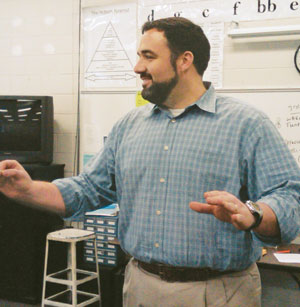
Because of our unusual rehearsal space, school administrators and staff at the Development Center had a first-hand experience hearing band students work on good sound and intonation as they polished difficult passages of music. My hope is that these people now have a better understanding of the work that goes into a productive music program, the teachers who direct it, and the students who thrive on music study.
